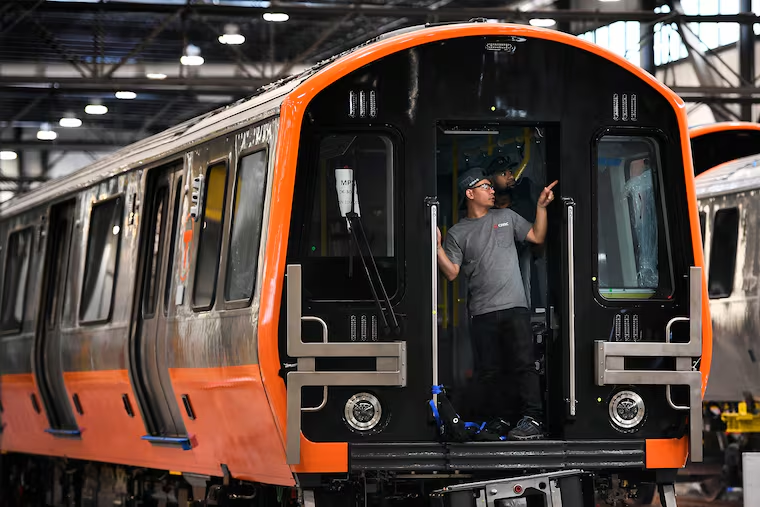SEPTA’s new railcars plagued by faulty wiring, repeated delays — and a federal investigation
Boston train cars made by a government-owned Chinese firm have had problems, including a battery explosion, a derailment, loose brake bolts and faulty wiring.

New double-decker Regional Rail passenger cars are three years behind schedule, and SEPTA officials have expressed concern about the quality of work performed by China Railway Rolling Stock Corp. (CRRC), the railcar manufacturer owned by China’s government.
Boston’s Massachusetts Bay Transit Authority says CRRC has delivered only 90 of the 404 new cars it ordered in 2014 for $800 million. Many of those have been sidelined by problems that include a battery explosion, a derailment, loose brake bolts, and faulty wiring that caused an electrical current to arc and strike a nearby train.
Separately, SEPTA’s $138 million contract with the Chinese firm is the subject of an audit by the inspector general of the federal Department of Transportation to make sure the transit authority is complying with a federal law requiring 70% of components in railcars to be made in the United States.
Too good a bargain?
CRRC, which is the largest producer of railcars in the world, broke into the U.S. market over the last decade, winning contracts from Chicago and Los Angeles, in addition to SEPTA and the MBTA in Boston.
Along the way, those deals have become embroiled in tensions between the United States and China over trade issues and national security.
American officials — and rival companies — complain that CRRC’s government ownership enables it to underbid competitors for public contracts by setting artificially low prices.
SEPTA ordered 45 commuter railcars from the firm in 2017. CRRC’s price was $34 million below its nearest competitor, the Canadian company Bombardier, which has about 25 years’ experience building railcars in America — to zero for the Chinese company.
It was too good a bargain to resist, SEPTA officials said at the time.
These days, they are hoping Boston’s experience with CRRC is not a preview of coming attractions here.
Repeated failures
In January 2022, SEPTA was frustrated by “delays and production shortcomings” in the first two cars CRRC was building for the agency, general manager Leslie S. Richards and board chairman Pasquale “Pat” Deon wrote to company executives.
They warned that SEPTA “must consider whether and how this program will proceed” and said the transit agency would not accept any railcars from CRRC with unresolved problems.
Among the problems, Richards and Deon said, were “repeated failures of watertightness tests,” faulty interior panels, wiring issues, repeated brake test failures, and “unsafe emergency exit windows.”
Moreover, the officials expressed concern that CRRC MA, the company’s American subsidiary, had not added staff at its Springfield, Mass., facility to handle the final assembly of SEPTA’s ordered cars. The plant has been understaffed and chaotic during production of the MBTA order, according to a recent Boston Globe story based on accounts of former workers.
SEPTA has the right to impose penalties on the company and can sue for damages, but “the focus is on working with CRRC to fix what’s wrong,” agency spokesperson Andrew Busch said. He added that several issues have been corrected, including the water leaks, and the company has provided detailed plans to address the others.
At one point last year, CRRC reworked staircases between the lower and upper levels of SEPTA’s cars because the clearance was too low, and many passengers would hit their heads on a panel, agency officials said.
The first two cars, earmarked as test vehicles for SEPTA, are in Los Angeles, after being shipped recently from Tangshan, China, where they were initially assembled and tested, Busch said. The cars were disassembled before shipping.
They will be moved to Springfield for assembly and then on to Philadelphia, though SEPTA does not know exactly when that will happen, he said.
“SEPTA inspectors will be on the ground” at the Massachusetts factory and will examine the cars closely, Busch said.
For the remaining 43 cars, the stainless steel shells will come from CRRC’s China plant and then be fully outfitted and assembled at the Springfield factory of CRRC MA, which also is building the MBTA cars.
A federal investigation
The inspector general’s audit was launched last Friday and first reported by the Boston Globe. In a memo, the office of the inspector general said it was looking at the Federal Transit Administration’s oversight of SEPTA’s compliance — and its certification that CRRC is compliant — with “Buy America” requirements for procurement of railroad rolling stock.
Republican members of the House Transportation and Infrastructure Committee requested that the inspector general look into the contract after photos of the SEPTA cars on the assembly line in China circulated on social media and were published in The Inquirer last July.
The cars in the images looked finished, and a spokesperson for the representatives said it “raised some flags for our members.”
Buy America requires that 70% of components in railcars built by a foreign-owned corporation be made in the United States, and that final assembly is done here. Investigators want to look at how SEPTA calculates the value of the foreign components in the cars, the DOT memo said.
“SEPTA has complied with all Buy America requirements throughout this process,” the agency said in a statement. According to its own audit, SEPTA found the cars will exceed Buy America requirements, with 150 “unique components” manufactured in the United States, according to the statement.
“We look forward to fully cooperating with the Inspector General’s audit.”